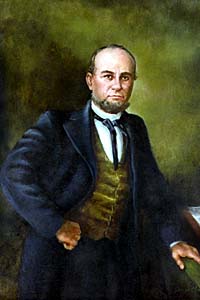James Johnson (Georgia politician) facts for kids
Quick facts for kids
James Johnson
|
|
|---|---|
 |
|
| 43rd Governor of Georgia | |
| In office June 17, 1865 – December 14, 1865 |
|
| Preceded by | Joseph E. Brown |
| Succeeded by | Charles J. Jenkins |
| Member of the U.S. House of Representatives from Georgia's 2nd district |
|
| In office March 4, 1851 – March 3, 1853 |
|
| Preceded by | Marshall J. Wellborn |
| Succeeded by | Alfred H. Colquitt |
| Personal details | |
| Born | February 12, 1811 Robeson County, North Carolina |
| Died | November 20, 1891 (aged 80) Chattahoochee County, Georgia |
| Resting place | Linwood Cemetery, Columbus, Georgia |
| Political party | Democratic |
| Alma mater | University of Georgia |
| Profession | Law |
| Signature | |
James Johnson (born February 12, 1811 – died November 20, 1891) was an important political figure from Georgia. He served in the U.S. House of Representatives and was the 43rd Governor of Georgia for a short time in 1865.
Contents
Early Life and Education
James Johnson was born in 1811 in Robeson County, North Carolina. His parents, Peter and Nancy McNeill Johnson, had Scottish roots. Later, his family moved to Henry County, Georgia. This county was newly formed from land that was previously held by Native American tribes.
Johnson attended Franklin College, which later became the University of Georgia. He graduated in 1832. Some of his famous classmates included Alexander H. Stephens and Crawford Long.
Starting a Family and Career
In 1834, James Johnson married Ann Harris. They moved to Columbus, Georgia, where he began his career in law. He became a lawyer in 1835. Johnson also worked with another lawyer, Henry L. Benning, to honor General Andrew Jackson.
Political Career
In 1851, James Johnson was elected to the United States House of Representatives. He represented Georgia as a "Unionist." This meant he supported keeping the United States together. Some people also called him a Whig. Later, he joined the American, or "Know-Nothing," party.
Johnson lost his re-election bid in 1853 to Alfred H. Colquitt. He was against states leaving the Union, which was known as secession. During the American Civil War, he mostly stayed out of the public eye.
Governor of Georgia
After the Civil War ended, U.S. President Andrew Johnson (who was not related to James Johnson) chose James Johnson to be the temporary Governor of Georgia. This happened on June 17, 1865. His main job was to help rebuild the state government, which had fallen apart.
He served as governor until October 1865. During this time, a special meeting was held in Milledgeville. At this meeting, Georgia officially canceled its decision to leave the Union. They also created a new state constitution and refused to pay back debts from the war.
After his time as governor, James Johnson tried to become a U.S. Senator. However, the state legislature chose Alexander H. Stephens instead.
Later Life and Legacy
President Johnson then appointed James Johnson to a new role. He became the collector of customs for the Port of Savannah. This meant he was in charge of collecting taxes on goods coming into the port. He held this job from 1866 to 1869.
After that, Johnson moved back to Columbus. He served as a judge for the Superior Court from 1869 until he resigned in 1875.
James Johnson passed away in 1891 in Chattahoochee County, Georgia. He was 80 years old. He is buried in Linwood Cemetery (Columbus, Georgia).
 | Janet Taylor Pickett |
 | Synthia Saint James |
 | Howardena Pindell |
 | Faith Ringgold |

